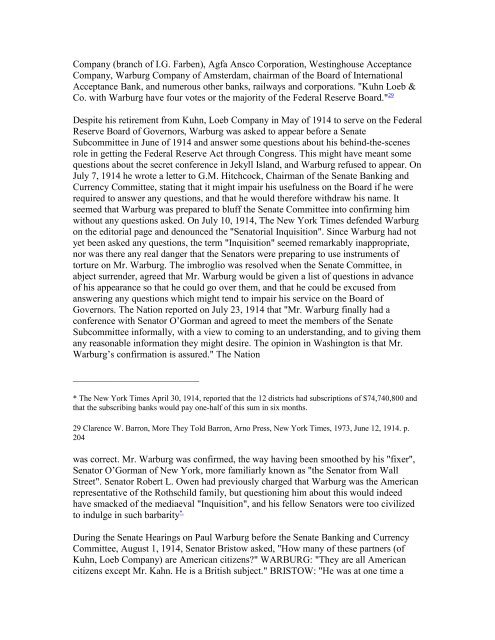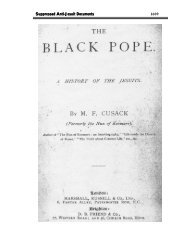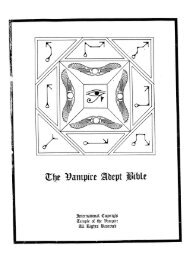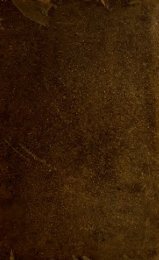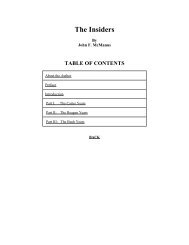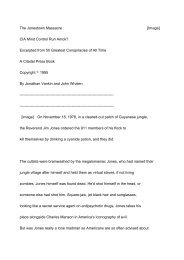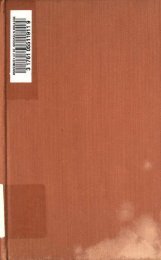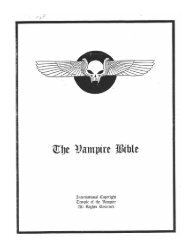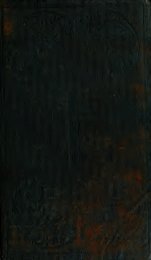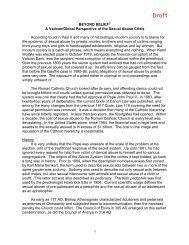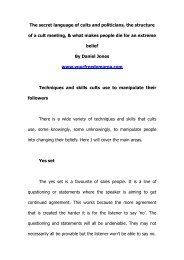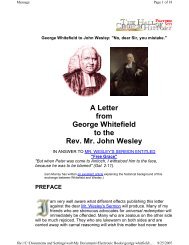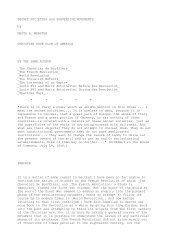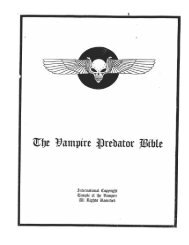SECRETS OF THE FEDERAL RESERVE - Shattering Denial
SECRETS OF THE FEDERAL RESERVE - Shattering Denial
SECRETS OF THE FEDERAL RESERVE - Shattering Denial
You also want an ePaper? Increase the reach of your titles
YUMPU automatically turns print PDFs into web optimized ePapers that Google loves.
Company (branch of I.G. Farben), Agfa Ansco Corporation, Westinghouse AcceptanceCompany, Warburg Company of Amsterdam, chairman of the Board of InternationalAcceptance Bank, and numerous other banks, railways and corporations. "Kuhn Loeb &Co. with Warburg have four votes or the majority of the Federal Reserve Board." 29Despite his retirement from Kuhn, Loeb Company in May of 1914 to serve on the FederalReserve Board of Governors, Warburg was asked to appear before a SenateSubcommittee in June of 1914 and answer some questions about his behind-the-scenesrole in getting the Federal Reserve Act through Congress. This might have meant somequestions about the secret conference in Jekyll Island, and Warburg refused to appear. OnJuly 7, 1914 he wrote a letter to G.M. Hitchcock, Chairman of the Senate Banking andCurrency Committee, stating that it might impair his usefulness on the Board if he wererequired to answer any questions, and that he would therefore withdraw his name. Itseemed that Warburg was prepared to bluff the Senate Committee into confirming himwithout any questions asked. On July 10, 1914, The New York Times defended Warburgon the editorial page and denounced the "Senatorial Inquisition". Since Warburg had notyet been asked any questions, the term "Inquisition" seemed remarkably inappropriate,nor was there any real danger that the Senators were preparing to use instruments oftorture on Mr. Warburg. The imbroglio was resolved when the Senate Committee, inabject surrender, agreed that Mr. Warburg would be given a list of questions in advanceof his appearance so that he could go over them, and that he could be excused fromanswering any questions which might tend to impair his service on the Board ofGovernors. The Nation reported on July 23, 1914 that "Mr. Warburg finally had aconference with Senator O’Gorman and agreed to meet the members of the SenateSubcommittee informally, with a view to coming to an understanding, and to giving themany reasonable information they might desire. The opinion in Washington is that Mr.Warburg’s confirmation is assured." The Nation__________________________* The New York Times April 30, 1914, reported that the 12 districts had subscriptions of $74,740,800 andthat the subscribing banks would pay one-half of this sum in six months.29 Clarence W. Barron, More They Told Barron, Arno Press, New York Times, 1973, June 12, 1914. p.204was correct. Mr. Warburg was confirmed, the way having been smoothed by his "fixer",Senator O’Gorman of New York, more familiarly known as "the Senator from WallStreet". Senator Robert L. Owen had previously charged that Warburg was the Americanrepresentative of the Rothschild family, but questioning him about this would indeedhave smacked of the mediaeval "Inquisition", and his fellow Senators were too civilizedto indulge in such barbarity *.During the Senate Hearings on Paul Warburg before the Senate Banking and CurrencyCommittee, August 1, 1914, Senator Bristow asked, "How many of these partners (ofKuhn, Loeb Company) are American citizens?" WARBURG: "They are all Americancitizens except Mr. Kahn. He is a British subject." BRISTOW: "He was at one time a


